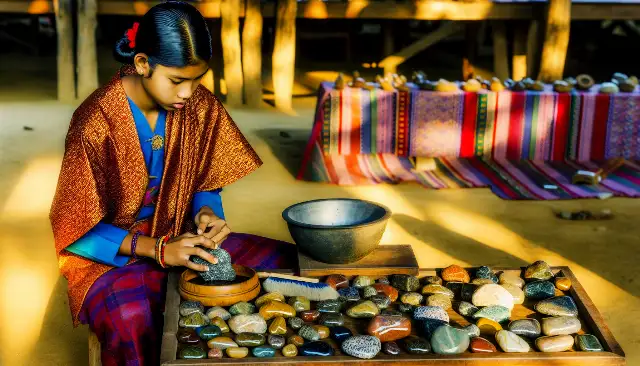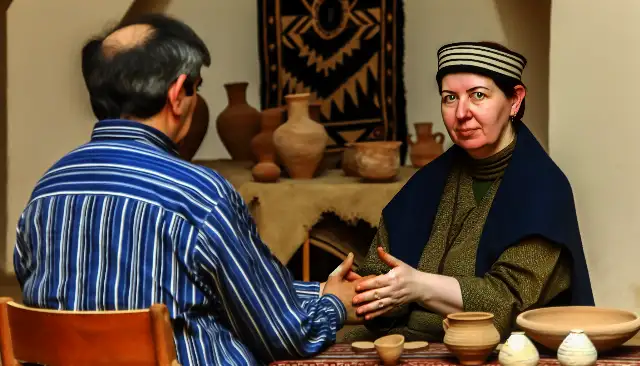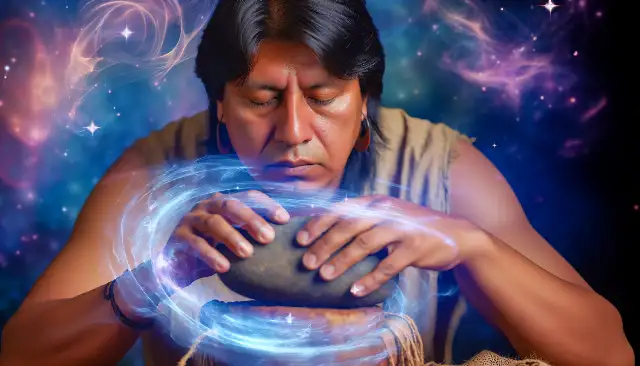I break stalking down into three components. First, there is stalking the self, which is primarily what the recapitulation is about. Second, there is stalking the world, learning to be fluid, detached, and compassionate. Third, is stalking the unknown, that place where all things are possible, other worlds, time, shape shifting, multiple simultaneous bilocation, death, ice cream, you know, the usual. Intent, dreaming, recapitulation, and fear, account for about ten percent of your energy the way it is used right now - stalking accounts for the other ninety percent.
Stalking is the art of moving your energy to a point of complete fluidity, which it will resist intensely. It is not anything like chasing your cat with a flyswatter. We give it the name stalking because we see it as essentially a hunting-down, a movement in itself. I don't want to talk about stalking outside yourself now, but internally, especially your own sense of self-importance.
The stalker needs four essential qualities to make any stalking effective: ruthlessness, cunning, patience and humor. Stalking is not the act of aggressiveness it may sound like - it requires compassion, and yet, it is brutal in its aspects as it affects us internally. A stalker is ruthless, but not aggressive. Cunning, but not cruel. Patient, but ready to act. Humorous, but at the same time, a terminator.
Stalking the self, which is really where personal issues and energy comes in, comes down more to an innate understanding of what is and what is not your personal responsibility. The recapitulation approaches this by taking back energy, but it can only take back what you are responsible for, your own energy. Stalking is an active process. If you know what your personal difficulties are, you still are left with how to overcome them, and this is where stalking becomes active. The recapitulation does this; it is an active process of energy retrieval. What you do with the energy once you get it back is your business, of course. It's sort of like losing your watch somewhere in the course of a day and then retracing your steps until you find it. You pick it up and take it, because after all, it's your watch.
So, why do we want to stalk anything? The short answer is because it removes us from any and all paradigms that we have created for ourselves. Stalking creates fluidity, tears down the rigidity with which we energetically live our lives. Since we aren't talking now about how to stalk other people or circumstances, we have to look at ourselves and see where stalking the self can be of advantage. Essentially, all stalking brings us back to ourselves and our own sense of self-importance. We have talked about ego before and how we construct our own personal identities, but self-importance is the framework upon which the ego sits. As such, it consumes an enormous amount of your energy.
Recapitulation and Stalking
Recapitulation is part of stalking the self - and a very important part. The goal or purpose of stalking is to eliminate your sense of self-importance. Stalking can be likened to the fluidity to be someone else in an instant and keep moving. The point is to be fluid in the moment with your energy in the face of the unexpected. The purpose, ultimately, is to free your energy to the point you can use it for other things. If you could be fluid, you could move anywhere because your sense of self-importance isn't holding you back. A master stalker can literally change personalities - at that moment they aren't acting, they are what they are being.
Stalking yourself is about breaking your old patterns in a meticulous sort of way, by forcing yourself to be something different than what you are, and then changing that. Stalking, if anything, should bring you face to face with your own nature.
Since we're talking of it in terms of self-importance, let's look at what that means. I've talked before about simply moving to where some energy that is bothering you is not. If you can stalk your own sense of self-importance, you can do that.
You need to start on two levels: the mental and the physical. These both have to be addressed to get at self-importance. What is the one thing that most guides peoples' lives - what one principle in their energy
Self-pity.
If you look at your feelings, you will find that self-pity has a big part in your existence. People thinking they deserve better, or that they shouldn't have been treated a certain way - that's self-pity. Most of how we react to life is motivated by fear and self-pity; these two things are the lion's share of self-importance. Your ego only needs to be the thing that gives expression to your personality; it should not dictate what IS that personality. A good stalker can get from point A to point B of what he/she needs to accomplish without using very much personal energy at all. If I wanted to stalk someone, for example, I would set an outcome as a goal, say six months down the road, maybe a year, and then I would stalk that outcome ruthlessly, with cunning and patience until it had been achieved. I can only do that if I don't have enormous amounts of energy tied up in things that waste energy, my energy.
As an example, I was diagnosed some years ago as clinically depressed. I knew that the depression was both physical in some aspects and mostly energetic, part of my own sense of self-pity. I set an outcome/intent of not being bothered by my depression anymore, to be rid of it, and in order to do that I had to move to a place where it wasn't. I set an intent to defeat myself, and I promised myself that if I could not defeat this in a certain period of time, I would be dead. And I damn well meant it. What I found was that I had to shred my own self pity, defeat my sense of self-importance, because that was where the depression rooted itself. I thought that somehow I deserved better. I started by changing things physically. If you buckle your belt with your right hand, switch sides with it and buckle it from the left. If you get up on the left side of the bed, get up on the right. Our self-importance loves routine. By changing your habitual routines, you throw yourself off balance. Things change, and you begin to move your energy out of them. I'm talking about routines at a very personal level. If you part your hair on the left, part it on the right and stalk the position of that being normal for you, then change it back. We crave the familiar, but shamans hate it, they want the big enchilada.
Stalking the Self
Now, let's talk about stalking from that internal level, since we have sort of covered the physical at least in passing. One of the prime features of stalking the self is the issue of responsibility. This is the place to start when stalking yourself and looking at your own self-importance. You need to be ruthless in doing it, but remember, ruthless doesn't mean aggressive. You must stalk the issue of what you are responsible for and what you are not. We all spend too much energy accepting responsibilities that are not ours. This is hard to understand in some ways, because as human beings we want to be liked and get along.
I would recommend this: when you start to feel depressed, upset, or worried about any situation, stalk it by ruthlessly deciding what is your responsibility in it and what is not. You will be surprised at how few things you worry about in life are really things for which you are truly responsible. Our self-importance makes us take ownership of a lot of things.
If you worry about not having money, ask yourself, "Why the worry? What is it?" You'll be surprised after you dig around in there for a while. In a sense, it is an attempt to move you to another position.
Stalking is a very active practice, though it may not seem like it at times. When you start looking at your own self-importance ruthlessly, you will be surprised at how you have been living your life in reaction to circumstance instead of proactively. Stalkers are warriors; they are literally hunting themselves out of existence in a 'real' world sense.









Comments